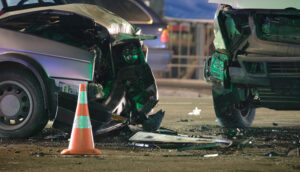Workplace injuries can occur in various scenarios, and when they happen on the road, determining coverage under workers’ compensation can become complex. The key factor in such situations is whether the accident occurred while performing work-related duties.
This blog explores the nuances of workers’ compensation coverage for car accidents at work, offering insights into what circumstances qualify for coverage and the exceptions to the rule. Contact PLBH at (800) 435-7542 if you have been injured in a vehicle-related accident at work and require a free legal consultation.
Work-Related Car Accidents and Coverage
In 2016, transportation-related incidents were highlighted as the leading cause of fatal work accidents, constituting 40 percent of all workplace fatalities, according to the Bureau of Labor Statistics. These statistics underscore the risks associated with work-related travel. Workers’ compensation is designed to cover employees who sustain injuries while engaged in their employment duties, which includes driving for work-related purposes.
Whether it’s making deliveries, traveling between job sites, or attending off-site meetings, if the accident occurs during these activities, workers’ compensation benefits typically apply. This coverage extends to various professions where driving is a core job function, such as delivery drivers, truck drivers, and taxi services, ensuring they are compensated for injuries sustained in the line of duty.
Exclusions and Exceptions
However, not all car accidents fall under the umbrella of workers’ compensation. The primary exclusion is the “going and coming” rule, which generally disqualifies accidents occurring during commutes to and from work or during unpaid breaks. Despite this rule, there are notable exceptions. If the employee was performing a work errand, driving a company vehicle, or involved in travel for which they are compensated, the accident might still be covered. Additionally, accidents occurring on company property or while fulfilling dual purposes (work and personal) may also qualify for workers’ compensation benefits.
Navigating the No-Fault System
A pivotal aspect of workers’ compensation is its no-fault nature. This means that employees are eligible for benefits regardless of who was at fault for the accident, provided it occurred within the scope of employment. However, this system typically precludes the possibility of pursuing a separate legal action for the same incident. There are circumstances under which an employee might have the legal ground to file a personal injury lawsuit against a third party responsible for the accident, alongside receiving workers’ compensation.
How [Business] Can Assist
At [Business], our expertise spans over 50 years in guiding employees through the intricacies of the workers’ compensation system. Our dual proficiency as seasoned personal injury attorneys allows us to approach work-related car accident cases from multiple angles, ensuring comprehensive legal support. Whether determining the eligibility for workers’ compensation benefits or exploring the potential for a personal injury claim, our team is equipped to provide the guidance and representation needed to secure the compensation you deserve.
Facing the aftermath of a work-related car accident can be daunting, especially when navigating the complexities of workers’ compensation coverage. If you find yourself in such a predicament, know that you don’t have to face it alone. Contact [Business] today to schedule a consultation with a workers’ compensation attorney who understands the nuances of these cases and is committed to advocating for your rights and best interests.

